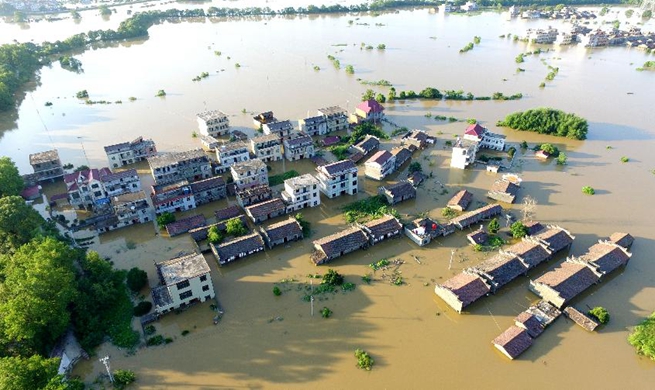UNITED NATIONS, July 9 (Xinhua) -- Liu Zhenmin, UN Under-Secretary-General for Economic and Social Affairs, on Monday emphasized that "this is no time to be complacent," while introducing a report of the secretary-general on progress toward the Sustainable Development Goals.
In the three years since world leaders committed to end poverty and hunger, countries have been working hard to translate this transformative vision into concrete results, with many reporting on progress this week, Liu said while addressing the UN High-level Political Forum on Sustainable Development, which will take stock of the progress on the Sustainable Development Goals (SDGs) and conclude on July 18.
While people are living better lives than a decade ago, with those below the extreme poverty line decreasing to 9 percent in 2017 from 27 percent in 2000, drought and disaster linked to climate change and surging conflicts "are hindering faster progress," he said.
Outlining other achievements and challenges, he said pockets of poverty persisted in rural areas, social protection had yet to reach 4 billion people in 2016, and the number of people suffering from hunger rose from 777 million in 2015 to 815 million in 2016.
However, since 2000, in sub Saharan Africa, the maternal mortality ratio declined by 35 percent and the under-five mortality rate dropped by 50 percent. In Southern Asia, a girl's risk of marrying in childhood declined by over 40 percent.
In addition, 4.5 billion people are unable to access safely managed sanitation services and 2.1 billion lack access to safe drinking water, he said.
Competing pressures on land to urbanize, expand agriculture and provide for increasing populations are threatening natural sites, with land degradation threatening security and development, he said, adding that global warming and climate related events are also on the rise.
Transitioning toward sustainable and resilient societies hinges on responsible management of finite resources, he said, noting that currently 108 countries have national policies on sustainable consumption and production.
Prosperous individuals and societies keep the world engine humming; however, it is the goals' aim to leave no one behind, he noted.
Citing further gains, he said people living without electricity dropped in 2016 to under 1 billion.
Yet, the number of conflicts over the past decade has increased, leading to millions being displaced and driving food insecurity in 18 countries, where 74 million urgently need assistance, Liu said.
"To understand accomplishments and setbacks and chart our way forward, we need reliable, timely, open and disaggregated data to inform all our actions," he said.
However, very few developing countries have fully funded statistical plans and the share of official development assistance (ODA) to statistics has hovered around 0.3 percent since 2010, he said, adding that fulfilling the ambition of leaving no one behind without timely and disaggregated data is impossible.
"We have only 12 more years to fully realize this transformative agenda, but these goals are absolutely within our reach," he said. "It will require policy-makers' unwavering attention, a laser-sharp focus on implementation of these goals and a true sense of urgency."
The forum is the main UN platform on sustainable development and it has a central role in the follow-up and review of the 2030 Agenda for Sustainable Development Goals (SDGs) at the global level.

















